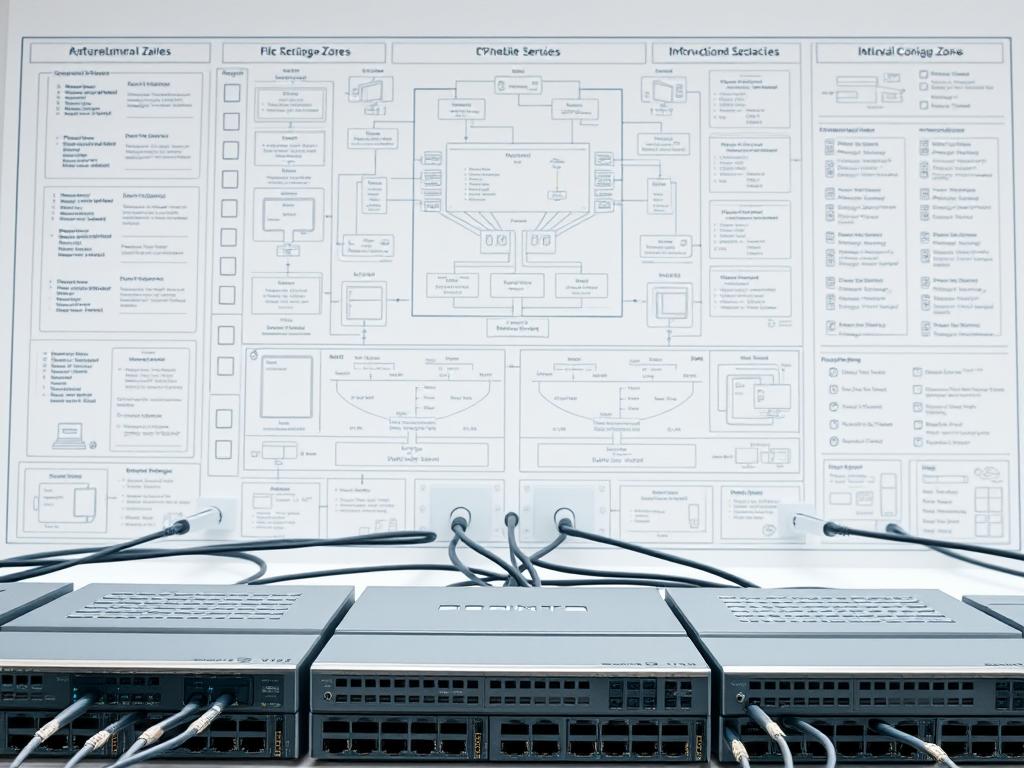Role and Responsibilities of a Computer Network Support Specialist
Computer network support specialists are vital guardians of digital infrastructure. They maintain and optimise computer networks across various industries. These IT professionals ensure smooth operation of organisational communication systems.
In 2016, the US employed about 198,800 network technicians. The field is growing rapidly. The Bureau of Labor Statistics forecasts 16,400 new jobs by 2026.
Network support specialists have diverse responsibilities. They troubleshoot complex network issues and implement critical security protocols. Their work is crucial for modern data management systems.
Job opportunities vary by location. Utah, Nevada, and Washington offer the most promising growth. Annual salaries range from £38,270 to £105,770, reflecting the role’s importance.
Aspiring professionals need a deep understanding of networks. They must develop advanced technical skills and exceptional problem-solving abilities. These competencies are essential for success in this dynamic field.
What is a Computer Network Support Specialist
Computer network support specialists are vital for maintaining digital infrastructure across various industries. As of 2016, nearly 198,800 professionals worked in this field in the United States. These experts ensure smooth operations of organisational computer networks.
These specialists analyse and troubleshoot complex computer network problems. They safeguard digital systems through hardware configuration and end-user training. Their role is crucial in protecting and maintaining network integrity.
Core Functions and Duties
Network support specialists manage several key IT responsibilities:
- Diagnosing network connectivity issues
- Implementing security protocols
- Performing system maintenance
- Providing technical guidance to employees
Position Within IT Department Structure
These professionals often work under network and computer systems administrators. They handle foundational technical challenges within the IT department. Senior staff typically address more complex systemic problems.
Key Industry Sectors
Computer network support specialists are in demand across various industries, including:
- Finance
- Healthcare
- Education
- Telecommunications
- Enterprise Software Solutions
The job growth rate for Computer Network Support Specialists is projected at 8.2%, outpacing the national average employment growth.
By 2026, this profession is expected to add 16,400 new jobs. With an average of 16,500 annual job openings, it offers promising career opportunities. Technically skilled professionals can find rewarding roles in this field.
Essential Skills and Qualifications Required
Network support specialists need a strong set of skills to thrive in technology. Employers look for professionals with broad IT qualifications. These show technical expertise across various areas.

Network support specialists can follow different educational paths. These include associate’s or bachelor’s degrees in computer science or IT. Professional certification programmes are also valuable.
Large companies often prefer candidates with a bachelor’s degree. This is due to the complex knowledge needed for advanced networks. Technical expertise is proven through industry-recognised certifications.
- Associate’s degree in computer science
- Bachelor’s degree in information technology
- Professional certification programmes
Continuous learning remains crucial in the rapidly evolving technology landscape.
Key certifications can boost career prospects. These include CompTIA A+, Network+, and Linux+. Each focuses on different areas of network support.
| Certification | Focus Area | Industry Recognition |
|---|---|---|
| CompTIA A+ | Hardware Fundamentals | Entry-Level Validation |
| CompTIA Network+ | Networking Protocols | Intermediate Expertise |
| CompTIA Linux+ | Operating Systems | Advanced Technical Skills |
Professional development through self-study, online courses, and industry webinars remains essential for staying current in network support roles.
Network Security and Maintenance Responsibilities
Network support specialists protect digital infrastructure from rising cybersecurity threats. They defend critical network systems as frontline guardians. The US Cybersecurity Agency reported a 62% increase in cyberattacks between 2021 and 2022.
Network security requires a thorough approach to safeguard digital assets. Specialists use multiple protection layers to reduce potential risks and vulnerabilities.
Security Protocol Implementation
Robust security protocols prevent unauthorised access and protect sensitive information. Key strategies are vital for network safety.
- Configuring advanced firewall settings
- Managing user access permissions
- Developing comprehensive security policies
- Conducting regular security assessments
System Backup Procedures
Effective system backups maintain data integrity and ensure business continuity. Specialists create backup strategies to protect critical organisational data.
- Creating regular data backup schedules
- Implementing redundant storage solutions
- Ensuring secure and encrypted backup processes
- Developing disaster recovery plans
Network Performance Monitoring
Continuous monitoring helps identify and resolve potential issues quickly. Specialists use advanced tools to maintain optimal network functionality.
- Real-time network traffic analysis
- Identifying and resolving bandwidth bottlenecks
- Monitoring system health and performance metrics
- Proactively addressing potential security vulnerabilities
Human error causes 80% of network downtime. Specialists are crucial in maintaining robust and secure network environments.
Technical Support and Troubleshooting Duties
Computer network support specialists are vital for maintaining organisational technology infrastructure. They diagnose and solve complex network issues that can disrupt business operations. Their role is crucial in providing comprehensive IT troubleshooting and technical support.
The core responsibilities of technical support professionals include:
- Rapid identification of network connectivity issues
- Systematic problem-solving for user technical challenges
- Detailed documentation of support requests
- Remote diagnostic interventions
- Implementation of efficient resolution strategies
IT support requires a methodical approach to problem-solving. Network specialists use advanced diagnostic tools and remote access technologies. These help them address technical issues quickly and efficiently.
Prompt issue resolution minimises operational downtime and maintains organisational productivity. This is crucial for keeping businesses running smoothly.
Communication is key in technical support roles. Specialists must explain complex concepts in simple terms for non-technical users. Their ability to clarify technical solutions sets exceptional IT support professionals apart.
Industry data shows support specialists resolve about 70% of issues on first contact. This highlights the importance of thorough technical knowledge and efficient troubleshooting skills.
Effective technical support is not just about solving problems, but preventing future technological disruptions.
Network Configuration and Hardware Management
Network configuration and hardware management are vital for computer network support specialists. These tasks ensure smooth connectivity and top performance across digital systems. Specialists handle complex technical duties to keep organisations running efficiently.

Experts in this field work on intricate network setup processes. They use advanced strategies for LAN/WAN setups. Modern networks require precise technical know-how and smart implementation.
LAN and WAN Setup Strategies
Setting up networks needs a deep grasp of local and wide area designs. Specialists tackle many technical hurdles when building strong network systems.
- Configuring router parameters
- Implementing network security protocols
- Defining network topology
- Ensuring scalable connection frameworks
Hardware Installation Protocols
Hardware management involves careful equipment setup and upkeep. Network specialists follow strict rules for installation. This ensures the system stays reliable.
| Hardware Component | Installation Considerations |
|---|---|
| Routers | Compatibility verification, firmware updates |
| Switches | Port configuration, VLAN management |
| Network Controllers | Performance optimization, security settings |
Software Implementation Standards
Adding software needs careful planning and execution. Network configuration specialists must blend new software smoothly with existing systems. They work to keep everything running well together.
By 2033, this key tech sector is set to have 178,800 jobs. This shows how important skilled network managers are becoming.
Career Growth and Professional Development
IT network support specialists have exciting career opportunities ahead. The field is set to grow 6% from 2021 to 2031. This means about 56,400 new job openings in the next decade.
Skill development and certifications are key to advancing in this field. Industry-recognised credentials from Cisco, CompTIA, and AWS can boost your expertise. CompTIA offers a structured pathway, starting with IT Fundamentals and progressing through advanced certifications.
Network specialists can transition into various roles. These include Network Administrators, cybersecurity specialists, or IT managers. Salaries range from £60,000 to £120,000 annually. Top earners can make over £130,000, showing the value of continuous skill improvement.
To advance, stay updated with new technologies. Take a proactive approach to professional growth. Internships, advanced degrees, and specialised training can give you an edge.
As cyber threats evolve, skilled network specialists are in high demand. Investing in your skills will position you well for future opportunities. The field of network management needs experts who can tackle complex challenges.
FAQ
What exactly does a computer network support specialist do?
Computer network support specialists maintain and optimise an organisation’s digital systems. They implement security protocols and manage network infrastructure. These professionals also resolve technical issues and ensure smooth operational efficiency.
What qualifications are needed to become a network support specialist?
Most candidates need an associate’s or bachelor’s degree in computer science or related fields. Industry certifications like CompTIA Network+ and Cisco CCNA are essential. Strong technical skills and proficiency in networking protocols are crucial.
Soft skills such as problem-solving, communication, and analytical thinking are equally important. These abilities help specialists excel in their roles.
Which industries employ network support specialists?
Network support specialists work in various sectors, including finance, healthcare, and education. They’re also found in telecommunications, technology firms, and government agencies. Each industry requires specialised network management tailored to its specific infrastructure.
What are the primary technical responsibilities of a network support specialist?
They configure network hardware and implement security protocols. Monitoring network performance and troubleshooting connectivity issues are key duties. Specialists also manage system backups and ensure data protection compliance.
How important is cybersecurity in this role?
Cybersecurity is crucial for network support specialists. They implement robust security measures and configure firewalls. These professionals also manage access controls and conduct vulnerability assessments.
Educating users about security best practices is another important responsibility. They protect organisational digital assets from potential cyber threats.
What career progression opportunities exist for network support specialists?
Network support specialists can advance to roles like network administrator or IT manager. They may become cybersecurity specialists or systems architects. Career growth often involves obtaining advanced certifications and pursuing specialised training.
What tools do network support specialists typically use?
They use network monitoring software and remote access technologies. Packet analysers and security assessment platforms are common tools. Bandwidth management tools and IT service management solutions help diagnose network issues.
How challenging is the day-to-day work of a network support specialist?
The role is dynamic, requiring constant problem-solving and adaptability to new technologies. Quick thinking during critical system failures is essential. Specialists must communicate complex technical issues to various stakeholders.
The job demands continuous learning and strong stress management skills. It’s a challenging but rewarding career path.
What are the typical working environments for network support specialists?
Network support specialists often work in offices, data centres, or remotely. They may be employed by corporate IT departments or technology firms. Some roles require on-call availability to address urgent technical issues.
How do network support specialists stay current with technological advances?
Professionals in this field attend industry conferences and pursue advanced certifications. They participate in online training programmes and engage with professional networks. Studying emerging technologies and cybersecurity trends is crucial for staying current.














